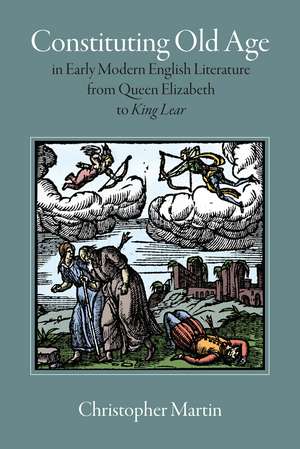Constituting Old Age in Early Modern English Literature, from Queen Elizabeth to King Lear: Massachusetts Studies in Early Modern Culture
Autor Christopher Martinen Limba Engleză Paperback – 28 noi 2012
How did Shakespeare and his contemporaries, whose works mark the last quarter century of Elizabeth I's reign as one of the richest moments in all of English literature, regard and represent old age? Was late life seen primarily as a time of withdrawal and preparation for death, as scholars and historians have traditionally maintained? In this book, Christopher Martin examines how, contrary to received impressions, writers and thinkers of the era—working in the shadow of the kinetic, long-lived queen herself—contested such prejudicial and dismissive social attitudes.
In late Tudor England, Martin argues, competing definitions of and regard for old age established a deeply conflicted frontier between external, socially "constituted" beliefs and a developing sense of an individual's "constitution" or physical makeup, a usage that entered the language in the mid-1500s. This space was further complicated by internal divisions within the opposing camps. On one side, reverence for the elder's authority, rooted in religious and social convention, was persistently challenged by the discontents of an ambitious younger underclass. Simultaneously, the aging subject grounded an enduring social presence and dignity on a bodily integrity that time inevitably threatened. In a historical setting that saw both the extended reign of an aging monarch and a resulting climate of acute generational strife, this network of competition and accommodation uniquely shaped late Elizabethan literary imagination. Through fresh readings of signature works, genres, and figures, Martin redirects critical attention to this neglected aspect of early modern studies.
In late Tudor England, Martin argues, competing definitions of and regard for old age established a deeply conflicted frontier between external, socially "constituted" beliefs and a developing sense of an individual's "constitution" or physical makeup, a usage that entered the language in the mid-1500s. This space was further complicated by internal divisions within the opposing camps. On one side, reverence for the elder's authority, rooted in religious and social convention, was persistently challenged by the discontents of an ambitious younger underclass. Simultaneously, the aging subject grounded an enduring social presence and dignity on a bodily integrity that time inevitably threatened. In a historical setting that saw both the extended reign of an aging monarch and a resulting climate of acute generational strife, this network of competition and accommodation uniquely shaped late Elizabethan literary imagination. Through fresh readings of signature works, genres, and figures, Martin redirects critical attention to this neglected aspect of early modern studies.
Din seria Massachusetts Studies in Early Modern Culture
-
 Preț: 281.05 lei
Preț: 281.05 lei -
 Preț: 291.90 lei
Preț: 291.90 lei -
 Preț: 289.58 lei
Preț: 289.58 lei - 8%
 Preț: 347.91 lei
Preț: 347.91 lei -
 Preț: 259.35 lei
Preț: 259.35 lei -
 Preț: 258.73 lei
Preț: 258.73 lei -
 Preț: 299.71 lei
Preț: 299.71 lei -
 Preț: 246.31 lei
Preț: 246.31 lei -
 Preț: 250.73 lei
Preț: 250.73 lei
Preț: 215.42 lei
Nou
Puncte Express: 323
Preț estimativ în valută:
41.23€ • 44.76$ • 34.63£
41.23€ • 44.76$ • 34.63£
Carte indisponibilă temporar
Doresc să fiu notificat când acest titlu va fi disponibil:
Se trimite...
Preluare comenzi: 021 569.72.76
Specificații
ISBN-13: 9781558499737
ISBN-10: 1558499733
Pagini: 240
Ilustrații: 3 b&w illus.
Dimensiuni: 152 x 229 x 18 mm
Greutate: 0.37 kg
Ediția:First Edition
Editura: University of Massachusetts Press
Colecția University of Massachusetts Press
Seria Massachusetts Studies in Early Modern Culture
ISBN-10: 1558499733
Pagini: 240
Ilustrații: 3 b&w illus.
Dimensiuni: 152 x 229 x 18 mm
Greutate: 0.37 kg
Ediția:First Edition
Editura: University of Massachusetts Press
Colecția University of Massachusetts Press
Seria Massachusetts Studies in Early Modern Culture
Recenzii
"I very much enjoyed reading this book. Christopher Martin presents a relatively fresh topic in ways that encourage interesting readings of canonical texts while, concurrently, bringing to light some new, fascinating material, particularly on Elizabeth I and the aging process. Additionally, he manages to weave in contemporary findings from gerontology studies and does so in a manner that makes these points easily understandable, without overwhelming readers with superfluous information from modern medicine."—Susan Cerasano, editor of Medieval and Renaissance Drama in England
"Writing beautifully and at times eloquently, Martin explores the subtleties of the paradoxes of growing old with a deft hand. . . . [He] considerably broadens our understanding of aging in the past."—Renaissance Quarterly
"[Christopher Martin's] discussion of Queen Elizabeth I's political managing of her aging body is particularly good: he contends that her various strange bodily displays during the late 1590s were not superannuated attempts at seduction but deliberate momento mori engineered for rhetorical purposes. His discussion of conflicting views of old age in King Lear is also worth reading."—Studies in English Literature
"Constituting Old Age is a valuable addition to the developing field of age studies in literary criticism, presenting new ways in which old age in literature can be 'about itself.' Its strengths lie in the considerable subtlety of Martin's close reading of literary texts, in his willingness to look across a range of authors and genres, and in his ability to bring the concerns of contemporary gerontology to bear on older texts and historical contexts."—Age Culture Humanities Journal
"Martin finds 'an essential circumspection' and a 'temperate and pliant senescence' in these figures that informs a sustained 'engagement with old age' in the English pastoral verse of the 1590s."—The Year's Work in English Studies, Volume 93
"Martin completes what deserves to be seen as a strongly organized and evidenced study on the topic. . . . The passages concerning Shakespearean plays and sonnets deserve to attract a wider audience and it is to be hoped that the nuanced understanding of old age as shown by Martin to feature in the texts becomes an accepted general method of approach to Shakespeare."—Journal of Aging
"Comprehensively researched . . . a useful addition to the small but growing volume of work on the relationship between literature and old age."—Aging and Society
"Much good can be said about how Martin considers how the queen, poets, and dramatists negotiate between the conventional, often caricatured, view of the old and one's own experience of growing old."—Essays in Criticism
"Perceptive. . . . Constituting Old Age in Early Modern English Literature, from Queen Elizabeth to King Lear is lucid and nicely written and contains much to interest the reader."—Modern Language Review
"Writing beautifully and at times eloquently, Martin explores the subtleties of the paradoxes of growing old with a deft hand. . . . [He] considerably broadens our understanding of aging in the past."—Renaissance Quarterly
"[Christopher Martin's] discussion of Queen Elizabeth I's political managing of her aging body is particularly good: he contends that her various strange bodily displays during the late 1590s were not superannuated attempts at seduction but deliberate momento mori engineered for rhetorical purposes. His discussion of conflicting views of old age in King Lear is also worth reading."—Studies in English Literature
"Constituting Old Age is a valuable addition to the developing field of age studies in literary criticism, presenting new ways in which old age in literature can be 'about itself.' Its strengths lie in the considerable subtlety of Martin's close reading of literary texts, in his willingness to look across a range of authors and genres, and in his ability to bring the concerns of contemporary gerontology to bear on older texts and historical contexts."—Age Culture Humanities Journal
"Martin finds 'an essential circumspection' and a 'temperate and pliant senescence' in these figures that informs a sustained 'engagement with old age' in the English pastoral verse of the 1590s."—The Year's Work in English Studies, Volume 93
"Martin completes what deserves to be seen as a strongly organized and evidenced study on the topic. . . . The passages concerning Shakespearean plays and sonnets deserve to attract a wider audience and it is to be hoped that the nuanced understanding of old age as shown by Martin to feature in the texts becomes an accepted general method of approach to Shakespeare."—Journal of Aging
"Comprehensively researched . . . a useful addition to the small but growing volume of work on the relationship between literature and old age."—Aging and Society
"Much good can be said about how Martin considers how the queen, poets, and dramatists negotiate between the conventional, often caricatured, view of the old and one's own experience of growing old."—Essays in Criticism
"Perceptive. . . . Constituting Old Age in Early Modern English Literature, from Queen Elizabeth to King Lear is lucid and nicely written and contains much to interest the reader."—Modern Language Review
Notă biografică
Christopher Martin is associate professor of English at Boston University and author of Policy in Love: Lyric and Public in Ovid, Petrarch, and Shakespeare.
